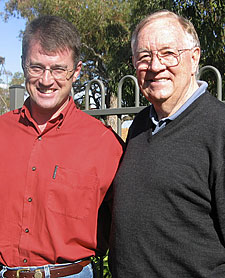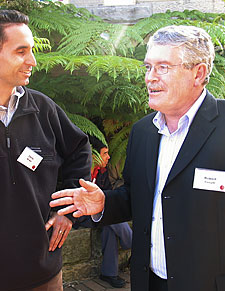Over 300 Sydney clergy and ministry workers descended upon St Anne's, Ryde to attend Dr Arch Hart's ministry burnout conference this week.
 Ministry Training & Development manager and registered psychologist, the Rev Mark Charleston was one of many clergy who valued the opportunity to gain Dr Hart's insights from a lifetime's experience and research as a clinical psychologist.
Ministry Training & Development manager and registered psychologist, the Rev Mark Charleston was one of many clergy who valued the opportunity to gain Dr Hart's insights from a lifetime's experience and research as a clinical psychologist.
"With both scientific precision and pastoral examples, Dr Hart emphasised the hazardous nature of Christian ministry in a world where stressors have increased in both frequency and kind," Mr Charleston says.
"And yet Dr Hart was neither pessimistic nor fatalistic. He drew attention to the fact that developments in recent psychology and medicine have yielded helpful insights and resources for Christian ministers and their congregations, especially in the areas of depression and anxiety."
Mr Charleston studied in the postgraduate program under Dr Arch Hart at Fuller Theological Seminary, California in 2005.
The doctor shares his wisdom
Dr Hart says his main purpose of running burnout conferences for pastors is to caution them from being caught up in "success syndrome'.
"The success syndrome of the world is contagious. Clergy can buy into that syndrome as if success is equivalent to salvation. That's deceptive!" Dr Hart warns.
"People can push themselves in the name of Christ but in the process be guilty of destroying their own personal life.
"It doesn't make sense to build your church but lose your life. I have heard too many clergy kids say "I had a pastor for a dad, but not a father'."
Dr Hart says there are three key things clergy can do to avoid burnout.
"Be more caring for yourself and your family; use the word "no' because it gives meaning to your "yeses'; and build recovery time into your week as Sunday is seldom a Sabbath for a minister."
Finally, Dr Hart says no person, including ministry workers, should feel ashamed for using anti-depressants.
"Anti-depressant medication is unique in its ability to rectify depression and provide protection from the effects of stress," he says.
"In fact, I have had a dozen ministers approach me at this conference and tell me they are on medication but have felt too ashamed to tell anyone before. No one should be ashamed of this."
 Bishop braces self for burnout
Bishop braces self for burnout
Bishop of South Sydney Robert Forsyth says Dr Hart's conference has equipped ministry workers with a better knowledge of how to understand themselves.
"Dr Hart has given a simple medical understanding allowing clergy to better look after themselves," Bishop Forsyth says.
"Even I've decided to be more mellow as a result."
Bishop Forsyth says the severe stress of parish ministry means ministers must take care of themselves now so they can be better ministers long term.
"With all the pressure of the Mission we have to make sure that ministers are driven but not in a way that leads to burnout."
Charleston's personal struggle
Apart from his psychological experience, Mr Charleston has known the challenges of reactive depression as a pastor.
"As a curate I conducted the funerals of my rector and an older sister within weeks of each other," he recalls.
"Working with your emotions and not denying them was a huge challenge for me at the time " and for quite a while after."
The burn out conference was organised by the Northern Region office under the guidance of Archdeacon Terry Dein.
Each morning of the conference Archbishop Peter Jensen led studies from 1 Corinthians 15 to lay the theological foundations for understanding humanity.
"These reminded us of the reality of fallen, sinful humanity and the glory of God's grace through Christ Jesus," Mr Charleston says.
"This conference has been a significant blessing to ministry staff from all over the Diocese."




















